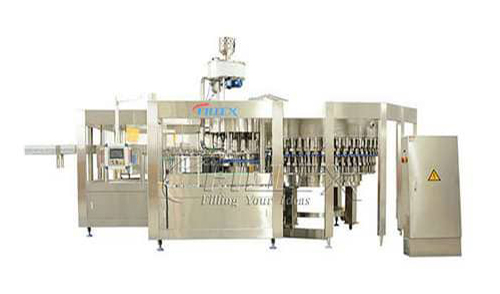The boxes containing empty water bottles are loaded on the track, and the production line is sent to the offloading tray system.
The trays are emptied one at a time, and the boxes are being sent to the offloading device with the production line, the empty water bottles are collected again from conveyer.
The emptied boxes are removed from the boxing machines and sent to washing machines via the conveyor belt, where it is washed before being transferred to the sides of the boxing machines to fill the beverage container.
Another conveyor transports the empty container from the unloaders to the bottle washers for decontamination and washing.
The bottle water filling device pours the water into bottle. The capping machines seals the water bottles and transports it out to the marking device for branding.

After labeling has been applied, it is being sent to the packaging line, for packaging, and then to the stacking rack device, where it is stacked on the rack, then finally sent to the factory.
Installation
The design of a simple bottle, cap, and bottle pad must all be standardized since the filling devices are automatic machines; before moving, then use rocker and switch the machines and see if it is unstable.
It is possible that you are able to drive once more.
This tool must be used correctly when tuning the device. To avoid any possible harm to the device or affecting its output, it is absolutely prohibited to replace part with inappropriate tools or by force.
When you've finished adjusting the unit, make sure to tighten any loose screw. Until moving, turn the unit only with rocker to see whether the rotation satisfies the requirements.
Washing and decontamination
The unit should be made clean at all times. To prevent harm to the system, it is strongly discouraged to still have oil, liquid, or debris on it.
As a result, this should:
(a) extract liquid or debris from the manufacturing in a timely manner.
(b) During delivery, wipe all segments of the device's surfaces and apply fresh lubricants to every operation department.
(c) It should always be washed or blew off with compressor once per week, particularly in areas that are difficult to clean during regular use.
Remove the liquid injection mechanism by loosening the upper and lower set screws, or disassemble separately for disinfection and cleaning.
To begin cleaning, submerge the inlet tube in the cleanser.
500ml designs which will have filling defects, such as the density of the volumetric flask preceding standard filling.
Bottle water filling machines needles tube, type 10 with a regular 10ml syringe, type 20 with a 20ml glass filler, and type 100 with a 100ml glass filler.
Constructing precautionary measures
Once the machines have been unpacked, inspect to see if the randomized technical data were accurate and if the device has been affected during transport, so that the problem can be resolved quickly.
Follow the outline description throughout this guide to install and configure the discharging assemblies and the feeders.
Lubricate each steel point with fresh lubricant.
Use the rocker to spin the unit to make sure it's running in the right direction (clockwise direction).
Contact us today for your bottle water filling machines
The implementation of an automated bottle filling system in your production earns these and several other economic advantages, including recycling bottles, improved perceived efficiency, and improving your corporate image.
Contact us at Fillex for the best kinds of bottle water filling machines.
Phone